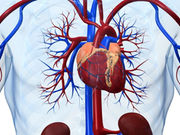Metoprolol cut incidence of malignant arrhythmias; was not linked to increase in adverse events
TUESDAY, April 5, 2016 (HealthDay News) — Early intravenous metoprolol before primary percutaneous coronary intervention (pPCI) does not reduce infarct size in a population with ST-segment elevation myocardial infarction (STEMI), according to a study published online April 3 in the Journal of the American College of Cardiology. The research is being published to coincide with the annual meeting of the American College of Cardiology, held from April 2 to 4 in Chicago.
Vincent Roolvink, M.D., from Isala Hospital in Zwolle, Netherlands, and colleagues randomized 683 patients with STEMI presenting <12 hours from symptom onset to intravenous metoprolol (336 patients) or matched placebo (346 patients) before pPCI. Overall, 54.8 percent of the patients underwent magnetic resonance imaging (MRI).
The researchers found that the infarct size did not differ between the metoprolol and placebo groups (P = 0.616). There was no between-group difference noted in the peak and area under the creatine kinase curve. The left ventricular ejection fraction, assessed by MRI, was similar between the groups (P = 0.68). Malignant arrhythmias occurred in 3.6 and 6.9 percent of the metoprolol and placebo groups, respectively (P = 0.050). There was no between-group difference noted in the incidence of adverse events.
“Early intravenous metoprolol before pPCI, was not associated with a reduction in infarct size,” the authors write. “Metoprolol reduced the incidence of malignant arrhythmias in the acute phase and was not associated with an increase in adverse events.”
The Early-Beta-blocker Administration before primary PCI in patients with ST-elevation Myocardial Infarction (Early-BAMI) trial was partially funded by Medtronic. The QMass software was partially supported by a scientific collaboration between CNIC and Medis.
Copyright © 2016 HealthDay. All rights reserved.








